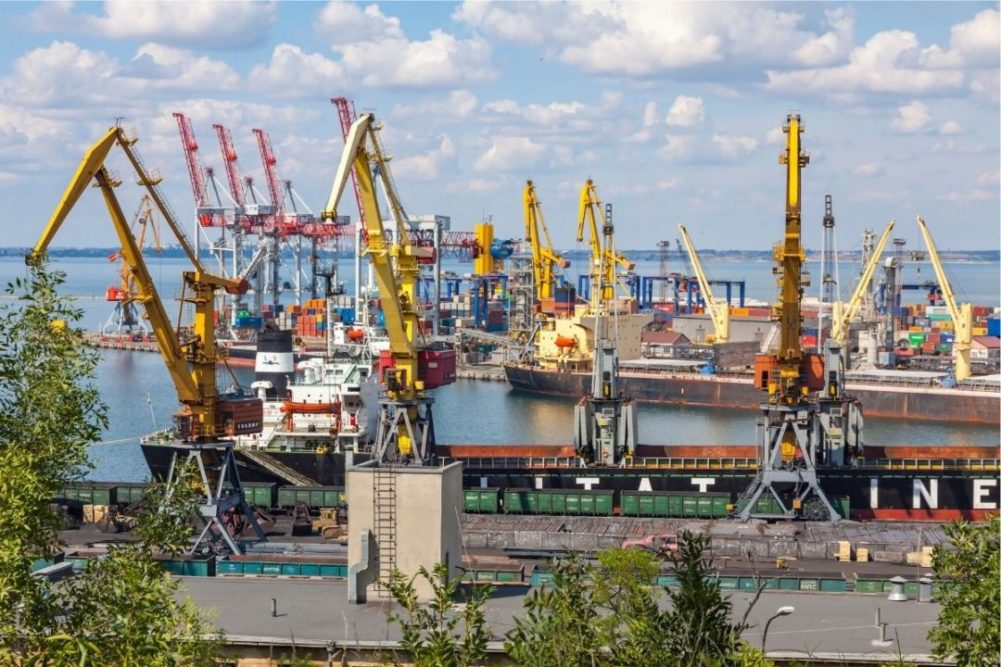ODESA, UKRAINE — A surprise cruise missile attack on Ukraine’s Port of Odesa by Russia on July 23, less than 24 hours after an agreement was signed to allow grain shipments out of Ukrainian ports, has not deterred Ukraine from preparing to export wheat, corn and other agricultural commodities in the coming days, a spokesman for the Odesa military administration said in an interview with World Grain.
Sergey Bratchuk, through an interpreter from his location in Odesa, Ukraine, told World Grain, a sister publication of MEAT+POULTRY, that preparations to load the more than 20 million tonnes of grain sitting in the country’s Black Sea ports onto ships have been ongoing since the deal between Russia and Ukraine was signed on July 22.
“Even immediately after the missiles hit the Odesa port, they continued the process to load ships with grain,” Bratchuk said.
As part of the deal, which was brokered by the United Nations and Turkey, officials from both countries agreed there would be no attacks on ships moving through the Black Sea to Turkey’s Bosphorus Strait and on to markets. Bratchuk said a joint coordination center for Ukrainian grain exports will be opened in a ceremony on July 27 in Istanbul.
“Hopefully in the next hours and days they will help us with the loading of ships and to start exporting grain from Ukraine,” Bratchuk said. “Ukraine intends to fulfill all of our agreements and to meet the world’s need for grain that will hopefully lessen the growing global food crisis.”
Ukraine is a major grain exporter, last year supplying 11% of the world’s wheat exports, 12% of corn exports and 43% of sunflower oil exports. Since Russia invaded Ukraine on Feb. 24, a naval blockade has prevented Ukraine from shipping grain out of its southern ports. The country has made a valiant effort to ship as much grain as possible via railways, roadways and rivers, but that has accounted for only a small percentage of its potential export total.
With one of the world’s biggest grain exporters on the sideline, global grain and food prices have soared during the last five months as has food insecurity, particularly in developing countries that are highly dependent on grain from the Black Sea region.
Bratchuk said one of the challenges facing logistics experts in the coming days is accounting for sea mines that have been placed in the Black Sea shipping lanes — by both Russia and Ukraine. He said Ukraine strategically placed mines there early in the war to keep Russian ships at a distance, but there is uncertainty about how many Russian mines are in the water and where they’re located.
“Russia stole several hundred sea mines from Ukraine during the Crimean conflict (in 2014) that they have placed in the Black Sea, and those mines are not controlled,” he said. “Ukraine put some mines near Odesa, but we know where they are. There will be some minesweeper ships that will go in front of the grain ships that leave the Odesa ports. We will create a safety route out of the Odesa ports and other ports.”
Bratchuk said that for now “Turkey has taken full responsibility to protect this corridor.”
“Hopefully they will be able to handle it, but I truly believe that other NATO (North Atlantic Treaty Organization) countries have to be involved to a much higher degree,” Bratchuk said.
Describing Russia as an untrustworthy “terrorist state,” Bratchuk said even he was surprised that Russian missiles were fired at the Port of Odesa just hours after the grain shipping agreement was signed. Of the four kalibr missiles fired, two were shot down by Ukraine anti-missile systems and two reached the port, damaging a pumping station area.
He said although the missiles did not strike any grain storage and handling infrastructure, they did detonate near them.
“There was some expectation after Russia signed the agreement that Odesa would be relatively safe,” he said. “We weren’t expecting a missile strike immediately after the agreement was signed.”
Bratchuk said as of July 26, two Russian ships carrying kalibr missiles were located relatively close to the Odesa region and that a dozen other Russian military ships were also in the Black Sea.
Although Ukraine has not been able to use its ports system to export grain since February, Bratchuk said the quality of the grain is good.
“We pay a lot of attention to the stored grain so that it meets all international standards,” Bratchuk said. “So, unless the grain silos have been damaged by (acts of war), the grain is in good condition. We also knew the war wouldn’t end in a couple of weeks, so we prepared in advance to have temporary storage for the new-season grain.”


